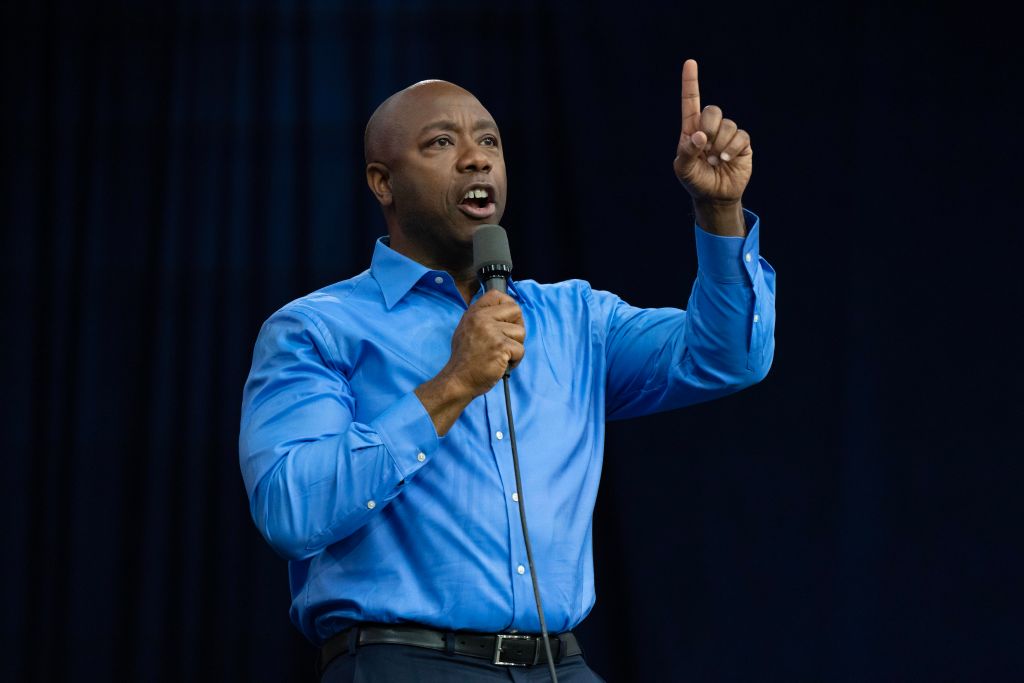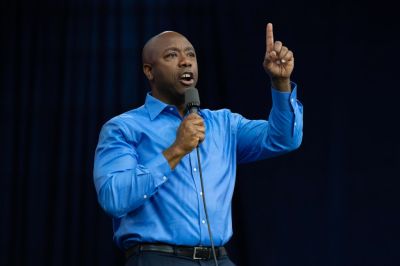Ron DeSantis has upped the ante for the other Republicans trying to defeat Donald Trump in the 2024 presidential primaries.
The Florida governor posted a big fundraising haul—$8.2 million in the first 24 hours since launching his bid—despite months of relentless hammering from Trump, embarrassing headlines about wavering donors, and a rocky campaign launch on Twitter. He has also been firing directly at the frontrunner, enforcing the sense that the GOP primary may quickly become a two-man race.
DeSantis’ early success raises the stakes for the candidates who had hoped to supplant him as the alternative to Trump.
To make the most of their summer, these candidates—call them the “Also Runnings”—have three benchmarks to meet: competitive fundraising, effective organizing and campaigning in the early primary states, and a standout moment in the first Republican National Committee-sanctioned debate this August in Milwaukee.
It’s in no way over for those candidates not named Trump or DeSantis, Republican operatives tell The Dispatch. But the expected field is already crowded: Sen. Tim Scott, former U.N. Ambassador Nikki Haley, former Vice President Mike Pence, North Dakota Gov. Doug Burgum, former New Jersey Gov. Chris Christie, businessman Vivek Ramaswamy, former Arkansas Gov. Asa Hutchinson, and any others who may jump in.
“They’ve all got a shot,” said Mike Murphy, a veteran Republican strategist. “Not-Trump is bigger than Trump. It’s not anti-Trump, but it’s not automatically for Trump.”
On financing, Trump and DeSantis are both loaded for bear. Trump currently has nearly $100 million combined in his campaign and supportive super PACs, and DeSantis is looking at more than $200 million. Only one other candidate has so far demonstrated comparable prowess: Scott, who brings from his 2022 Senate run $22 million of usable campaign funds, plus a super PAC that’s expected to be backed substantially by Oracle co-founder Larry Ellison, one of the richest men in the world.
Two others have personal fortunes they could spend on their campaigns: Ramaswamy, the 37-year-old pharmaceutical businessman who has already put in millions of his own money into his race, and Burgum, who before his governorship sold his software company to Microsoft for more than $1 billion.*
Beyond that group, however, Republicans will need to raise millions over the next few months from traditional bundlers and small-dollar donors if they’re to stay competitive. And a few wealthy benefactors for a supportive super PAC, which can take unlimited donations, would be nice.
Haley, who spent part of this week in New York and Connecticut to raise money, has so far struggled to put up impressive numbers—raising just $3.3 million in the first quarter of 2023 plus another $5 million across two additional committees supporting her campaign.* She and others are trying to keep pace with Trump on small-dollar donations through direct appeals online—an exercise in attention-grabbing that Ramaswamy, a regular Fox News fixture before announcing his campaign, has leaned into.
A candidate like Hutchinson, running as a sober-minded foil to Trump, appears unlikely to tap into the outrage-fueled small-dollar donor pool. Nor is it clear how the former governor of Arkansas, a relatively small state, will be able to compete with others for the favor of the GOP’s donor networks and bundlers.
Meanwhile, those who have established relationships with the party’s stalwart donors, such as Christie and Pence, face high expectations for their own ability to raise money. Activating those networks often means closed-door dinners or marathon calls to potential backers—the sort of labor-intensive work that can take away from pressing the flesh with actual voters.
To that end, beating Trump and DeSantis for the nomination begins with beating at least one of them in the first two states running nominating contests.
“It’s Iowa and New Hampshire,” said Murphy. “You’re nowhere if you’re not getting out of there.”
The Also Runnings will need to make camp in one of those two states for the summer, with periodic jaunts to the other plus the occasional trip to South Carolina or Nevada. Haley, for example, has already made four trips each to Iowa and New Hampshire, holding dozens of events.
Several candidates are making their first stand in Iowa, whose caucuses tend to reward intense organizing and, for Republicans, a socially conservative message. Take Pence, who’s not even officially a candidate yet: He’s made more than a dozen trips to Iowa this year, and a super PAC supporting him, Committed to America, has set up its headquarters in the Hawkeye State.
Anything but a strong showing there could force him to reevaluate his candidacy—though he’s not the only one. After launching his bid last week, Scott has campaigned almost exclusively in Iowa. His team sees the state, with its heavily evangelical Republican base, as fertile ground for a win that can springboard him to his home state of South Carolina, which holds its primary shortly after New Hampshire’s.
New Hampshire Republicans, meanwhile, are less socially conservative and more libertarian and have grown particularly comfortable with seeing candidates up close in town-hall settings and peppering them with specific policy questions.That’s why Christie spent most of his 2016 White House bid in New Hampshire and is likely to camp out in the Granite State again. And Hutchinson could find a place for his moderate tone among those New Hampshire Republicans who consider themselves independent.
The anti-Trump vote could be larger in New Hampshire because of the state’s open primary, which would allow Democratic voters and learners to skip the non-competitive Democratic primary and choose a GOP ballot.
But all the campaign dollars and precinct captains in Iowa won’t be worth much for the Also Runnings if they don’t make a splash with a national audience. Their first chance may come in the first GOP debate in August in Milwaukee.
“Trump and DeSantis have the highest name ID and a lot of cash, but campaigns are also about moments—who has them and can then build from them,” said Doug Heye, a longtime Republican operative. “Those happen in debates and forums—and when voters are paying attention.”
Of course, past primary contests are riddled with candidates—Herman Cain, Carly Fiorina, and Newt Gingrich for starters—who had a game-changing debate performance but failed to follow through with a well-organized, early-state effort or the financial resources to turn a viral moment into momentum.
What would ultimately set apart an Also Running from the pack is just that: some sort of clear separation—on policy or on message.
“If you think back to the Democratic primary debates last time, there was no differentiation,” said Dave Carney, a Republican strategist with roots in New Hampshire. “They’ve got to figure out a way to differentiate themselves.”
Christie, for example, has already telegraphed his plans to go after Trump directly and exclusively, even though Trump has said he won’t attend the Milwaukee debate. “He can’t defend his record, he can’t defend his conduct, and he’s afraid to get on stage with anybody who will call him to task on it,” Christie told our David Drucker on The Dispatch Podcast last month.
And Pence has indicated he’ll be a more traditional conservative voice, including talking about entitlement reform—an issue most Republican candidates in recent years have run away from, following Trump’s lead.
But the key, say those with experience on presidential campaigns, will be in seizing the opportunity to differentiate—and for some of the Also Runnings, those could be few and fleeting. Moderators may feel compelled to give DeSantis and, if he participates in later debates, Trump the most time to talk given their dominance in the polls at the moment. Those who seem like the longest shots could get just one chance to make an impression.
Changing the narrative—that the Republican nomination is a fight between the frontrunner Trump and his challenger DeSantis—when debating in front of a national audience is the most important task for anyone looking to catapult themselves out of the Also Running camp.
Otherwise, according to GOP operatives like David Kochel, their continued candidacy will bleed money, stifle other potential challengers, and reinforce the existing dominance of Trump and DeSantis: “If that remains the dynamic after the first few debates, everyone will have to look at what their impact is staying in.”
*Corrections, June 2, 2023: Vivek Ramaswamy is 37 years old, not 38, as the article originally stated. Also, this article originally misreported the Haley campaign’s fundraising totals.







Please note that we at The Dispatch hold ourselves, our work, and our commenters to a higher standard than other places on the internet. We welcome comments that foster genuine debate or discussion—including comments critical of us or our work—but responses that include ad hominem attacks on fellow Dispatch members or are intended to stoke fear and anger may be moderated.
With your membership, you only have the ability to comment on The Morning Dispatch articles. Consider upgrading to join the conversation everywhere.